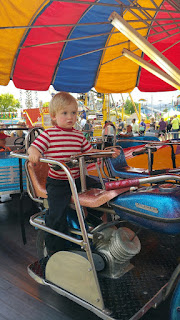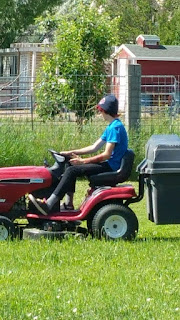I just spent an hour writing the most perfect blog post. Then I accidentally deleted it. Then I cried. Now I am going to try to write it again...
In February, I wrote in the Sego Lily School blog to explain that Corbin, my oldest, had decided to attend public school. You can read more about that
here, but the short version is that he wanted to see what high school is like, and have the experience most kids in our country are having on a daily basis.
It is a struggle for me, now, to not title this post "How Public School Broke My Kid." This, of course, is just my playing with language - my kid is not broken. But oh man, did it do a number on him. Here's what happened.
First, the good stuff: Corbin did well in his classes. He was proud that he passed all of his classes at the end of his first term, especially since he started late and had to catch up to make those grades. He even did well with math - he and I spent several evenings together while I helped him with algebra and geometry, and he managed to pick up most of it very quickly. He enjoyed his photography class, and even won an award at the district art show for one of his 3-D art class projects. He learned a lot about free speech - including the fact that you will face resistance when what you have to say goes against the grain. He also made a few friends, and got to see what education looks like for most people his age.

The negatives, however, far outweighed the positives. Corbin felt bullied every day. As a non-straight, gender fluid person, he struggled to find acceptance. He listened to others debate his gender behind his back. Even at the GSA after school club (gay straight alliance), he found no one who could see outside our societies binary structure of gay or straight, male or female. He experienced bullying from teachers as well - when he chose not to stand for the pledge, one teacher responded with his personal views about his military service, leaving Corbin feeling as though he was being pressured to take actions he strongly opposes. Corbin also shared many stories with me of being the only person in a class with any knowledge of, or interest in, the subject matter. He was experiencing the all-too-real dynamic of kids who don't care about learning. He wasn't always enthusiastic about everything he was doing, but I heard in his voice the sadness of being the only one who seemed to care.
So much of what was happening, though, was intangible. My kid - the one who has always been opinionated, but has also always been up for a good conversation - stopped talking. He took on a victim mentality, and started speaking as though he was hopeless and had no choice in his life. One night we were talking about his future, and he stated that his only goal was to make enough money to live. He no longer cared about college, or any meaningful career, and all he wanted to do was get out of the house as soon as possible.
His father and I had become the enemy. He wasn't hateful, he just didn't want to be around us, or talk to us, or interact with us more than the absolute minimum. He was resentful that his dad was waking him up for school in the mornings (after practically begging to go to school!), and wouldn't open up to either of us about what was going on in his social life.
One night, after some drama, the three of us were sitting together attempting to get to the bottom of what was going on. What I realized in that conversation was that Corbin really did feel as though he had no choice. I don't know if being part of the crowd of 3,500 kids had made him lose his voice, or forget how to use it, or something else, but we have always taught him that we can fix any problem through communication, and he wasn't talking. I mentioned him not finishing the school year (part of the agreement we had when we started), and he said "I thought that wasn't an option." As soon as he realized that he could choose, he began to discuss the things he wanted to do - graduate from Sego Lily School next year, apprentice with a photographer, finish out Odyssey of the Mind projects for World Finals, and more.
Within a day, he was talking to me about where he was going (including exact addresses), how he was feeling, and what he wanted to do. Within a week, he had opened up about some personal stresses he has been struggling with. He got to work on Odyssey props, starting communicating with his brothers, and became happy again. It was like a light came back on in him.
Here's the thing about resiliency. We tell parents who come to Sego Lily School that yes, their children will learn to read and write, and add, and everything else they need to know to be successful in the world, but more importantly they will learn lessons about who they are, how they learn, and who they want to be in their lives. I can honestly say that those lessons are things Corbin learned. Yes, he needed a reminder and a nudge to remember that he learned them, but without those lessons I fear we would be facing intensive therapy with him right now. Instead, he bounced back into being my opinionated, vocal, amazing child. Yes, he's a tired teenager, busy trying to figure out how the world works, but he is OK. He isn't broken, that's for sure.
I'm not one to say "I told you so," but I will say this. When Corbin was little, I knew that a standard educational experience was not going to work for him. I decided to take on the joys, stresses, workload, and insanity of starting a school and keeping it alive for him, and for his brothers. I say to you now, my children - this is for you. It was the right thing to do, and it continues to be the right place for me to put my time and energy. I won't question that again after this experience (well, I might, but in those moments I will remind myself of this moment). I'm sorry we had to learn a lesson in such a painful way, but it was worth it.





































